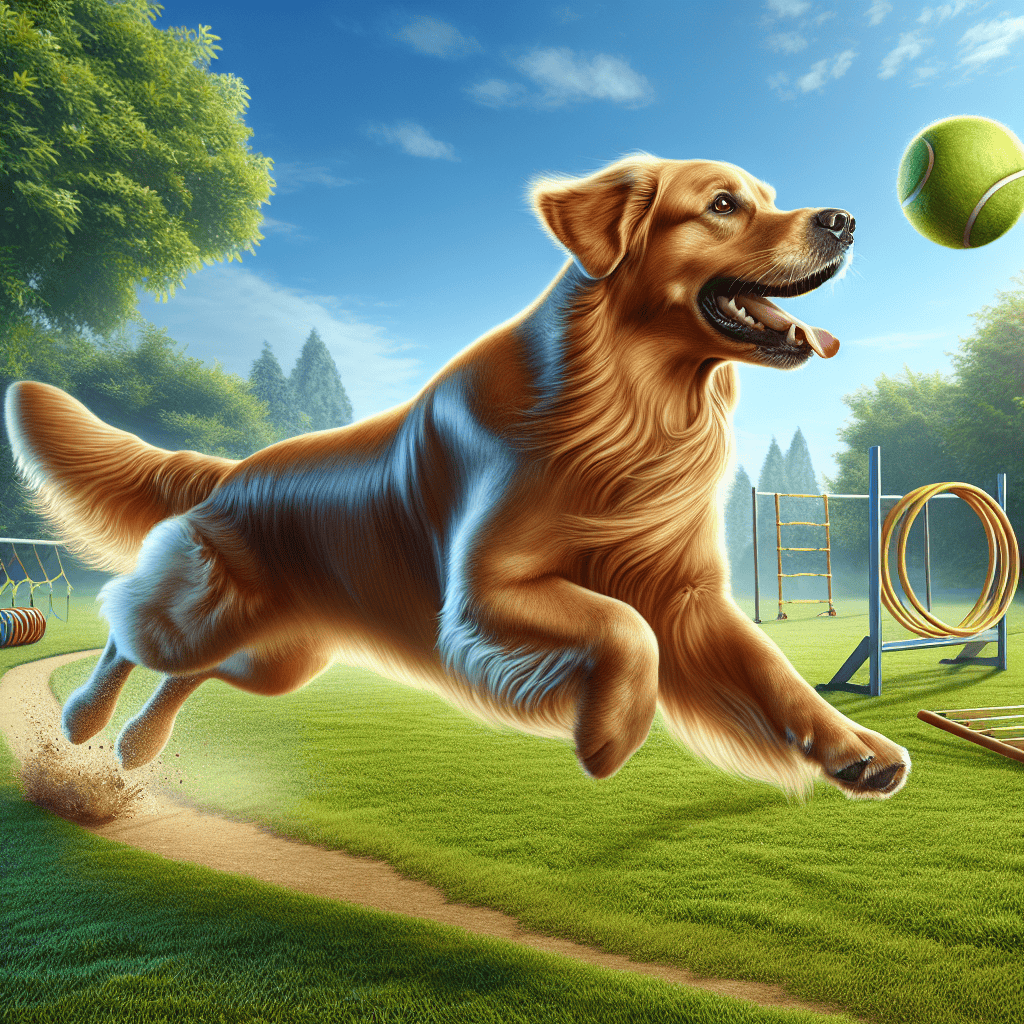Golden Retriever Exercise Needs
When it comes to golden retriever exercise requirements, regular physical activity is key to their overall well-being. Golden Retrievers are an energetic and active breed that requires ample exercise to keep them healthy and happy. In this section, we will explore the importance of exercise for Golden Retrievers and discuss how to tailor their exercise routine to meet their specific needs.
Importance of Exercise for Golden Retrievers
Exercise plays a vital role in the physical and mental health of Golden Retrievers. Regular exercise helps prevent obesity, joint problems, arthritis, and can even contribute to a longer lifespan for these beloved dogs (Quora). Lack of exercise can lead to behavioral issues such as destructive chewing and excessive barking. Engaging in physical activities keeps Golden Retrievers physically fit, enhances muscle tone, and helps maintain a healthy weight.
Tailoring Exercise to Golden Retrievers
Golden Retrievers have specific exercise needs that should be taken into consideration. As an active breed, they require a minimum of two hours of good exercise per day (PDSA). This exercise should be spread out across the day to prevent overexertion.
To meet the exercise requirements of a Golden Retriever, a combination of activities should be incorporated into their routine. Here are some guidelines to consider:
-
Walks: Regular walks provide an excellent opportunity for exercise and mental stimulation. Aim for at least two walks per day, ensuring they are long enough to keep your Golden Retriever engaged and allow them to explore their surroundings.
-
Running and Playtime: Golden Retrievers enjoy running and playing fetch, making it an ideal activity for them. Engage in interactive play sessions that involve retrieving toys or balls, allowing them to exercise their natural retrieving instincts.
-
Training: Incorporating training sessions into your Golden Retriever’s routine not only provides physical exercise but also mental stimulation. Golden Retrievers are intelligent dogs, and training exercises help keep their minds sharp and focused.
-
Swimming: Many Golden Retrievers have a natural affinity for water. Swimming is an excellent low-impact exercise that is easy on their joints while providing a full-body workout. If you have access to a safe swimming area, consider including swimming sessions in their exercise routine.
Remember to consider your Golden Retriever’s age, health condition, and individual preferences when tailoring their exercise routine. If you have a golden retriever puppy, it’s important to provide age-appropriate exercise and avoid overexertion. As they age, their exercise needs may change, so adjust their routine accordingly.
By understanding the importance of exercise for Golden Retrievers and tailoring their exercise routine to meet their specific needs, you can ensure that your furry friend stays healthy, happy, and well-exercised. Alongside exercise, it’s also important to address other aspects of their care, such as golden retriever temperament, golden retriever health issues, and providing a well-balanced diet.
Daily Exercise Requirements
To keep your Golden Retriever happy and healthy, it is crucial to meet their exercise requirements. Golden Retrievers are active and energetic dogs that require a minimum of two hours of exercise per day (PDSA). This exercise should be spread out throughout the day and include a variety of physical activities and mental stimulation.
Exercise Guidelines for Golden Retrievers
When it comes to exercising your Golden Retriever, it’s important to keep a few guidelines in mind. Firstly, ensure that the exercise is suitable for your dog’s age, health, and fitness level. Puppies have different exercise needs compared to adult or senior Golden Retrievers. Consult with your veterinarian to determine the appropriate exercise routine for your dog based on their specific needs.
When planning your Golden Retriever’s exercise routine, aim for a combination of activities that provide both physical and mental stimulation. This can include walking, running, playing fetch, swimming, and interactive play sessions. Golden Retrievers are known for their retrieving instincts, so games like fetch can be particularly enjoyable for them (PDSA).
Physical Activities for Golden Retrievers
Golden Retrievers thrive on physical activities that allow them to burn off their excess energy. Here are some physical activities that are well-suited for Golden Retrievers:
- Regular Walks: Take your Golden Retriever on daily walks to provide them with exercise and mental stimulation. Aim for at least two walks per day, each lasting around 30 minutes to an hour.
- Running or Jogging: Golden Retrievers are excellent running companions. If you enjoy running or jogging, consider taking your Golden Retriever with you for a workout.
- Swimming: Many Golden Retrievers have a natural affinity for water. Swimming is a low-impact exercise that is gentle on their joints while providing a great cardiovascular workout.
- Playtime and Interactive Toys: Engage in play sessions with your Golden Retriever using toys like balls, frisbees, or rope toys. These activities allow them to run, jump, and retrieve, which aligns with their natural instincts.
Remember to consider the weather conditions when exercising your Golden Retriever. During hot weather, exercise them during cooler parts of the day to prevent overheating. Always provide fresh water and take breaks when needed.
By following these exercise guidelines and incorporating physical activities into your Golden Retriever’s daily routine, you can help them maintain a healthy weight, improve their overall fitness, and promote their overall well-being.
Mental Stimulation for Golden Retrievers
While physical exercise is important for Golden Retrievers, it’s equally crucial to provide them with mental stimulation. Golden Retrievers are intelligent dogs that can get bored easily, so engaging their minds is essential for their overall well-being and behavior. Mental exercise helps enhance their cognitive abilities and prevents boredom.
Importance of Mental Exercise
Mental exercise for Golden Retrievers is just as important as physical exercise. Providing mental stimulation helps keep their minds sharp and prevents behavioral issues that may arise from boredom. Activities that challenge their problem-solving skills and keep them mentally engaged contribute to a well-rounded and balanced behavior.
Retrieving games, in particular, are enjoyable for Golden Retrievers as they were originally bred for this purpose. Incorporating tasks like obedience training, puzzle toys, or even agility courses can provide mental stimulation and keep them focused and content (PDSA).
Engaging Activities for Golden Retrievers
There are various engaging activities that can provide mental stimulation for Golden Retrievers. Here are some examples:
-
Puzzle Toys: Puzzle toys are designed to challenge dogs mentally and keep them entertained. These toys often require dogs to figure out how to retrieve treats or solve puzzles to access rewards. They can provide hours of mental stimulation for your Golden Retriever.
-
Obedience Training: Golden Retrievers are known for their trainability and eagerness to please. Engaging in obedience training sessions not only provides mental stimulation but also strengthens the bond between you and your furry friend. Teaching them new commands and tricks keeps their minds active and focused.
-
Hide and Seek: Playing hide and seek with treats can be a fun and stimulating game for your Golden Retriever. Hide treats around the house or in the yard and encourage them to use their scenting abilities to find the hidden treasures. This activity taps into their natural instincts and provides mental exercise.
-
Trick Training: Teaching your Golden Retriever new tricks not only provides mental stimulation but also adds an element of fun to their routine. From simple commands like “sit” and “stay” to more complex tricks like “roll over” or “play dead,” trick training challenges their minds and keeps them engaged.
-
Scent Work: Golden Retrievers have an exceptional sense of smell. Engaging them in scent work activities, such as finding hidden objects or participating in nose work classes, can provide both mental and physical exercise. These activities tap into their natural abilities and provide an outlet for their instincts.
Remember, the key to mental stimulation is to keep the activities varied and challenging. Rotate different games and toys to prevent boredom and ensure your Golden Retriever remains stimulated and content. By providing mental exercise alongside physical exercise, you can help your Golden Retriever lead a happy and fulfilling life.
Weight Management for Golden Retrievers
Maintaining a healthy weight is crucial for the overall well-being of Golden Retrievers. Obesity can lead to various health problems and significantly impact their quality of life. In this section, we will explore the importance of preventing obesity in Golden Retrievers and the significance of monitoring their weight.
Preventing Obesity in Golden Retrievers
Golden Retrievers are prone to becoming overweight, so it’s essential to take proactive measures to prevent obesity. Regular exercise and a balanced diet play key roles in weight management. Golden Retrievers require a minimum of two hours of good exercise per day, which should be spread out across the day and include walks, running, playtime, and training (PDSA). Regular physical activity helps to burn calories, maintain muscle tone, and prevent weight gain.
In addition to exercise, proper nutrition is crucial for weight management. Feeding Golden Retrievers a complete and balanced diet in appropriate portions is essential. Avoid overfeeding or giving high-calorie treats, as these can contribute to weight gain. Consult with a veterinarian to determine the appropriate caloric intake and feeding schedule for your Golden Retriever based on their age, size, and activity level.
Monitoring Golden Retrievers’ Weight
Regularly monitoring your Golden Retriever’s weight is an important aspect of weight management. Keeping track of their weight allows you to identify any changes or potential issues early on. Weigh your Golden Retriever regularly using a pet scale or by visiting your veterinarian. If you notice any significant weight gain or loss, consult with a veterinarian to determine the underlying cause and establish an appropriate plan of action.
Maintaining a healthy weight for your Golden Retriever not only helps prevent obesity-related health problems but also supports their joint health. Golden Retrievers are prone to hip dysplasia and other joint issues, and excess weight can exacerbate these conditions (dvm360). By managing their weight, you can reduce the strain on their joints and improve their overall mobility and comfort.
In summary, preventing obesity in Golden Retrievers is crucial for their overall well-being. Regular exercise, proper nutrition, and weight monitoring are key components of weight management. By providing your Golden Retriever with the right amount of exercise and a balanced diet, you can help them maintain a healthy weight and reduce the risk of obesity-related health problems. For more information on Golden Retrievers, check out our article on golden retriever breed information.
Exercise Tips for Different Life Stages
Golden Retrievers have varying exercise needs depending on their life stage. Tailoring exercise routines to each stage is essential for maintaining their overall health and well-being. In this section, we will explore exercise recommendations for Golden Retriever puppies, adult Golden Retrievers, and senior Golden Retrievers.
Exercise for Golden Retriever Puppies
Golden Retriever puppies are bundles of energy and require regular exercise to support their growth and development. It’s important to provide appropriate exercise while taking into account the puppy’s age and physical limitations.
According to My Golden Retriever Puppies, a general guideline is to provide at least 5 minutes of exercise for every month of the puppy’s age up to one year. For example, a three-month-old puppy would benefit from approximately 15 minutes of exercise daily. However, it’s crucial to avoid excessive exercise that may lead to growth plate injuries, as puppies are still developing.
Engaging in low-impact activities, such as short walks, playtime, and mentally stimulating games, can help puppies burn off excess energy while building their coordination and social skills. These activities should be spread throughout the day to prevent overexertion.
Exercise for Adult Golden Retrievers
Adult Golden Retrievers typically require 20-30 minutes of exercise twice a day to maintain good health, strong muscles, healthy joints, and weight management, according to My Golden Retriever Puppies. Regular exercise is essential for preventing obesity, which can lead to various health issues.
Adult Golden Retrievers thrive on physical activities that provide both mental and physical stimulation. Activities such as brisk walks, jogging, swimming, and retrieving games are excellent choices. Engaging in these activities not only helps them burn calories but also strengthens their bond with their owners.
To prevent boredom, which can lead to destructive behaviors, it’s important to vary the exercise routine. Incorporating puzzle toys, obedience training, and interactive play sessions can provide mental stimulation and keep their minds sharp.
Exercise for Senior Golden Retrievers
Senior Golden Retrievers, typically classified as seniors at eight years old, may experience decreased energy levels and mobility. It’s important to adjust their exercise routine to accommodate their changing needs.
According to Snowy Pines White Labs, senior Golden Retrievers can benefit from activities that are low-impact and gentle on their joints. Regular walks at a comfortable pace help maintain their mobility and promote mental stimulation. Monitoring signs of fatigue, such as taking a long time to get up during a walk, is important. If signs of exhaustion are observed, it’s crucial to allow them to rest and recover.
Senior Golden Retrievers may also benefit from mentally stimulating exercises, such as puzzle toys or obedience training, to keep their minds sharp and engaged.
Establishing a regular exercise routine for Golden Retrievers from a young age and adjusting it as they age is crucial to keeping them physically and mentally fit. Monitoring signs of exhaustion and adjusting the intensity and duration of exercise accordingly is essential for their overall well-being. Regular exercise helps Golden Retrievers live long and healthy lives.
By providing appropriate exercise for Golden Retrievers at each life stage, owners can ensure their beloved companions remain active, happy, and healthy.
Common Health Issues in Golden Retrievers
Golden Retrievers are generally healthy dogs, but like any breed, they may be prone to certain health issues. It’s important for Golden Retriever owners to be aware of these common health concerns and take appropriate measures to keep their furry friends healthy and happy.
Skin and Ear Health
Skin irritation, allergies, and ear infections are common health issues in Golden Retrievers. Allergies often arise between the ages of 1 and 3 and can manifest as paw licking, red and infected paws, rubbing of the face and ears, and frequent ear infections. To address these issues, it’s advisable to consult a veterinarian for proper diagnosis and treatment. Treatment options may include oatmeal baths, antihistamines, and other remedies tailored to the specific condition. Regular grooming, including cleaning the ears and keeping the coat clean, can also help manage skin and ear health. For more information on Golden Retriever health issues, refer to our article on golden retriever health issues.
Weight-Related Health Concerns
Maintaining a healthy weight is crucial for Golden Retrievers, as excessive weight can lead to various health problems. Obesity is a common concern, and it’s important to prevent it by providing a balanced diet and regular exercise. Obesity in Golden Retrievers can contribute to issues such as joint stress, heart disease, and respiratory problems. To maintain an optimal weight, monitor your Golden Retriever’s food intake, provide portion-controlled meals, and engage in regular physical activities. For more guidance on weight management, consult our article on golden retriever breed information.
Hip Dysplasia and Joint Health
Golden Retrievers are prone to hip dysplasia, a condition where the hip joint doesn’t develop properly. According to Forbes, approximately 19.6% of all Golden Retrievers show abnormal or dysplastic hips. Hip dysplasia can result in mobility issues and discomfort for the dog. Factors contributing to hip dysplasia include genetics, environmental factors, exercise types, excessive weight, and poor nutrition. To mitigate the risks, it’s essential to provide a balanced diet, maintain an appropriate exercise routine, and consult with a veterinarian for guidance on joint health. For more information on hip dysplasia and joint health, refer to our article on golden retriever breed information.
Being aware of these common health issues in Golden Retrievers allows owners to take proactive steps to prevent or manage them. Regular veterinary check-ups, a balanced diet, exercise, and proper grooming are key factors in maintaining the overall health and well-being of Golden Retrievers. Remember, prevention and early intervention are key when it comes to your Golden Retriever’s health.















